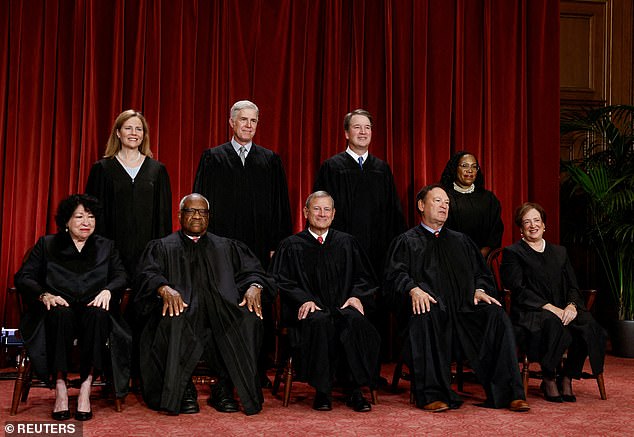An Alaska man has been arrested for threatening to torture and murder six Supreme Court justices and their family members.
The Justice Department announced Thursday that the man, identified as Panos Anastasiou, 76, sent more than 464 messages through the court’s public website.
The messages, which date from March and July 2023, contained “violent, racist and homophobic rhetoric,” according to the complaint. He also allegedly threatened to kill the judges through “torture, hanging and firearms.”
The man was arrested and charged with a total of 22 counts of threatening a federal judge and interstate commerce. He faces more than 100 years in prison if convicted on all charges.
It is unclear whether the judges targeted are the six conservative judges whose opinions Anastasiou “disagreed with.” According to FEC records, he donated to ActBlue, a Democratic platform, in July.
“We allege that the defendant made repeated and egregious threats of death and torture to Supreme Court justices and their families in order to retaliate against them for decisions with which he disagreed,” said Attorney General Merrick Garland.
The arrest comes during a turbulent week for the high court following another explosive article published in the New York Times.
The Justice Department announced Thursday that the man sent more than 464 messages through the court’s public website.
Leaked memos revealed Supreme Court Chief Justice John Roberts’ involvement in allowing the court to hear key cases involving Donald Trump.
The conservative judge took the lead in the March case over whether states could remove the former president from their ballots for his role in the Jan. 6 attack on the Capitol.
Roberts demanded a unanimous decision from the court, according to memos leaked to the New York Times.
He also took up the case involving Justice Samuel Alito’s prosecution of the Jan. 6 rioters after his fellow conservative became embroiled in a dispute over his wife’s flying the Stars and Stripes flag upside down from their home.
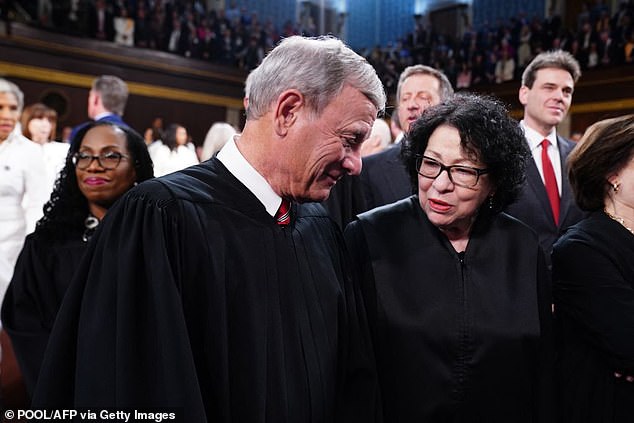
Chief Justice John Roberts with Associate Justice Sonia Sotomayor

The court’s decision on presidential immunity was a blow to judicial efforts to prosecute Donald Trump for his role in the January 6 attack on the Capitol.
Roberts told his colleagues they should take up the case after an appeals court ruled that Trump did not enjoy presidential immunity for his alleged role in trying to overturn the results of the 2020 presidential election.
“As I read it, it simply says that a former president can be prosecuted because he is being prosecuted,” he said of the lower court’s ruling.
And he made no secret of what he believed his colleagues should decide.
“I think we’re likely to view the separation of powers analysis differently,” he wrote in a February memo.
Some conservatives wanted to postpone the decision until after the November presidential election, but Roberts demanded an early decision and then insisted on writing the opinion himself.
“In a case like this, focusing on ‘transitory outcomes’ can have profound consequences for the separation of powers and the future of our Republic,” he wrote loftily. “Our perspective must be more clear-sighted.”
The decision was a major blow to judicial attempts to prosecute the former president.
And Roberts failed to secure the unanimity he demanded, prompting a scathing dissent from liberal Justice Sonia Sotomayor, who lamented that the ruling had given Trump “all the immunity he sought and more.”
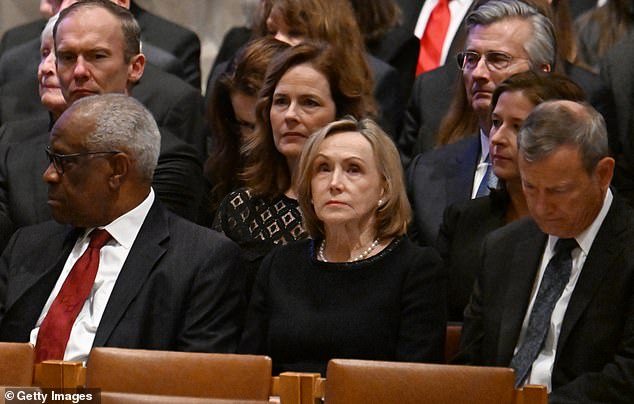
Justice John Roberts, front right, with his wife Jane Sullivan, center, at the memorial service for former Supreme Court Justice Sandra Day O’Connor in December of last year.
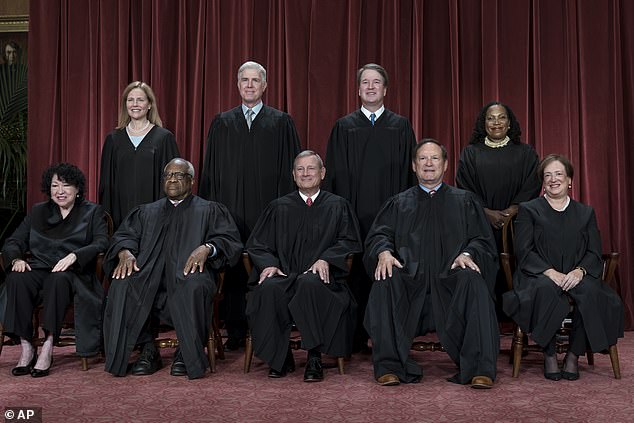
Justice John Roberts presides over a Supreme Court with a 6-3 conservative majority
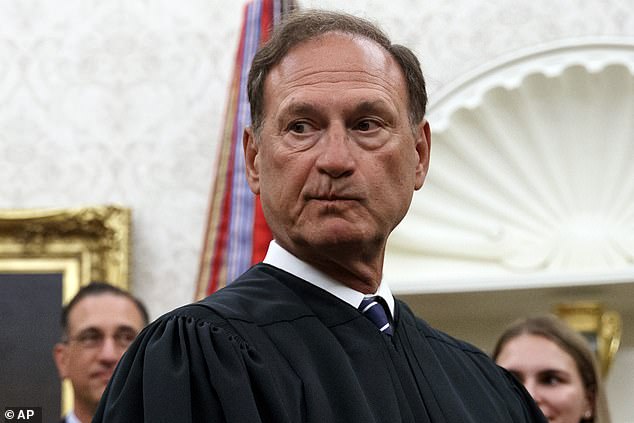
Roberts asked conservative Supreme Court Justice Samuel Alito to write the opinion on the obstruction prosecution of the Jan. 6 rioters.

But he brought it back and wrote it himself when Alito became embroiled in questions about whether his wife had shown sympathy for the “Stop the Steal” movement by waving a flag upside down.
She warned that it protected “treasonous acts,” transformed the president into “a king above the law” and led her to “fear for our democracy.”
But she received warm praise from conservatives on the court for her proactive work, with Justice Brett Kavanaugh thanking her for her “extraordinary opinion” and “exceptional work.”
The nine justices had decided to strike down Colorado’s attempt to remove Trump from the ballot, the newspaper reported.
But he lost that unanimity when he demanded a ruling stating that congressional action would be necessary for the constitutional ban on insurrectionists taking office to apply to the president.
In April, Roberts asked Alito to write the opinion when the court was asked to consider whether the Justice Department had overstepped its bounds in its prosecution of the Jan. 6 rioters for obstruction.
About 250 were charged with “obstructing an official proceeding,” a charge prosecutors were considering bringing against Trump himself.
Alito soon found himself embroiled in questions about whether his wife had shown sympathy for the “Stop the Steal” movement by waving a flag upside down.
But Alito did not recuse himself from the case, and Roberts took it up again and put his own name on it.
The change of authorship was not reported at the time, but Roberts wrote the opinions on key cases affecting Trump’s chances of a second presidency.

“If you don’t fight like hell, you’re not going to have a country anymore,” Trump told supporters on January 6.
Roberts, who was appointed to the court by President George W. Bush, had insisted that “no one is above the law in our system and that includes the president,” at his confirmation hearing in 2005.
He was furious when the court’s opinion on Roe v. Wade was leaked before its official publication in May 2022.
He called it “absolutely appalling” and a “flagrant breach” of court confidentiality.
The ruling itself sidelined Roberts, who did not win the support of any of his eight colleagues for his attempt to toughen without extinguishing the constitutional right to abortion.
The latest leaks suggest he has sought to reassert his authority with a vengeance in the two years since then, but have alarmed constitutional and legal experts.
“I thought the chief was politically astute, but it’s crazy that he thought the immunity decision would be well-received,” wrote law professor Jake Charles. “It seems he’s in an echo chamber, too.”

